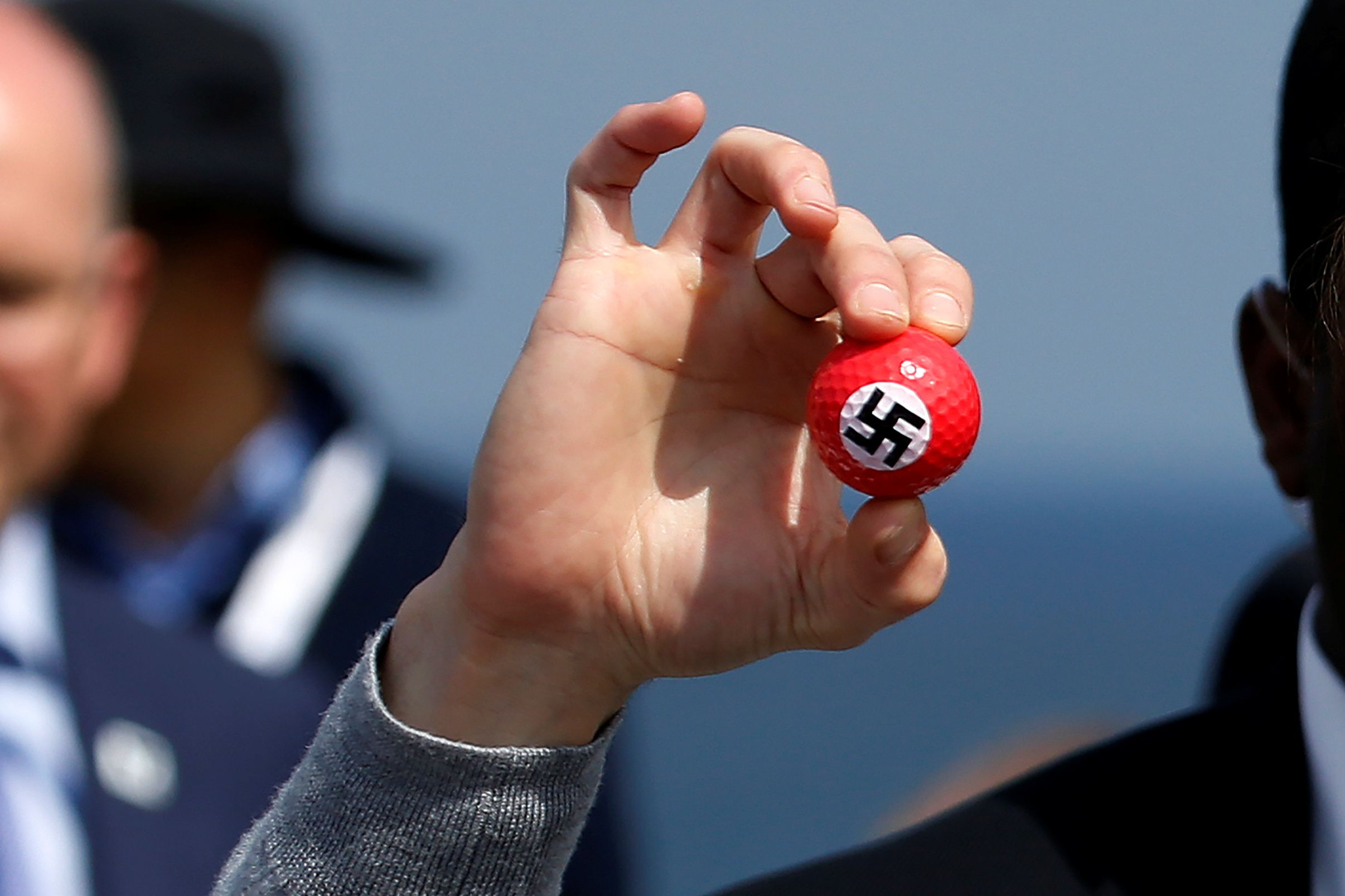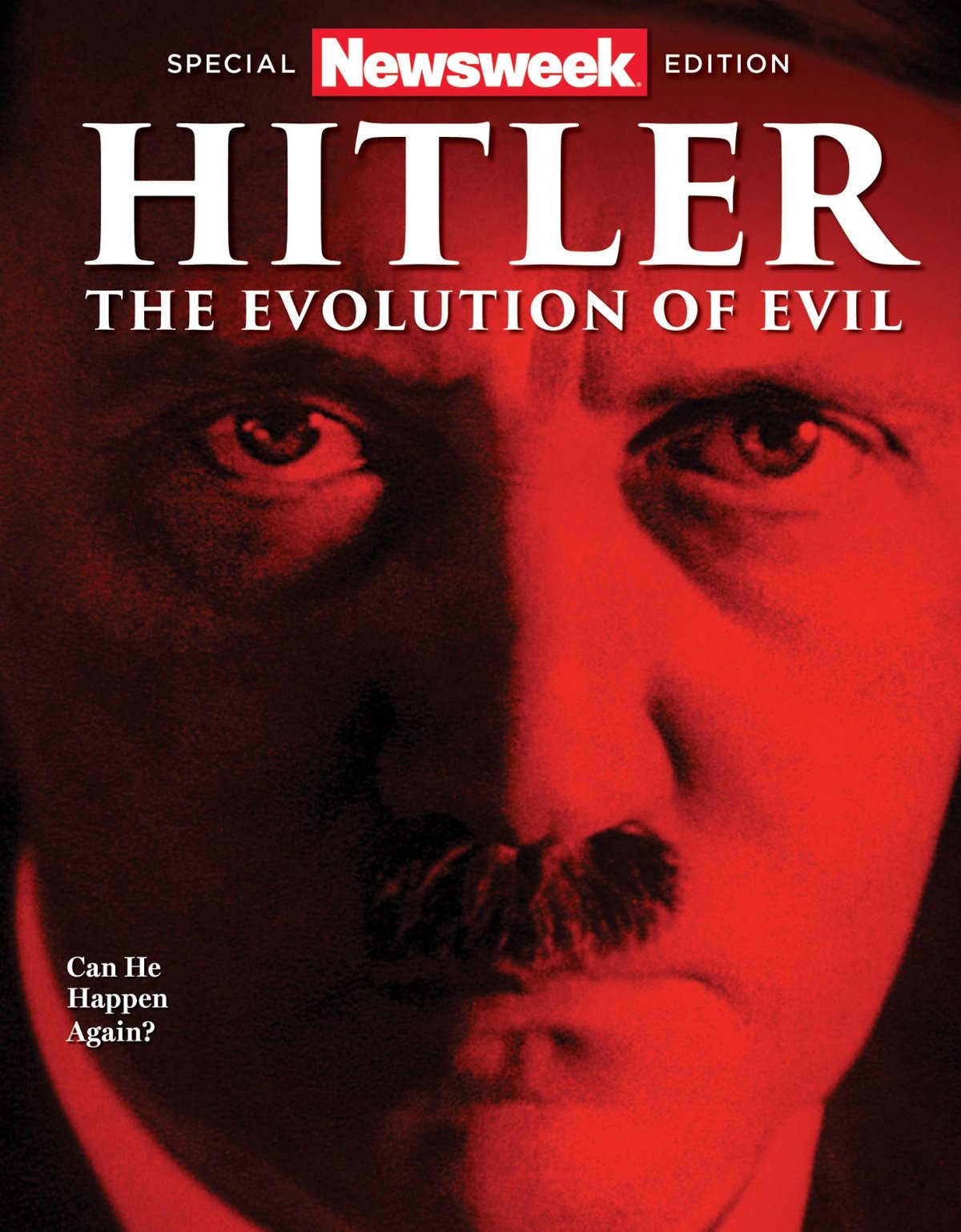
This article, and others about about one of history's most frightening figures and the rise of 21st century Neo-Nazis, is featured in Newsweek's Special Edition: Hitler— The Evolution of Evil.
As Tsarist Russia crumbled beneath the strength of the Bolshevik Revolution in 1917, the "White Armies"—loyal to the tsar and so-called to distinguish them from the communist "Red Army" led by Leon Trotsky—found a ready scapegoat for their recent misfortune in the most unoriginal of places. In a propagandistic coup that would have made Goebbels proud, during the Civil Wars that followed the revolution every White Army commander was given a copy of The Protocols of the Learned Elders of Zion from which he would read to his soldiers. The book, a proven forgery that details a vast Jewish plot to take over the world, helped lay blame for communist revolution on Jews that has yet to fully abate.
According to Professor Gavriel Rosenfeld of Fairfield University and author of Hi Hitler!, a book-length examination of Hitler's legacy— including the inexplicable softening of his image in an increasingly ironic age—the ham-fisted propaganda of The Protocols represented a simple case of "more of the same" for Europe. "Historically, the Jews were always the primary scapegoat because they were the only real dominant minority, by which I only mean in terms of presence, not necessarily of numbers," Rosenfeld explains. "Anti- Semitism was a way of coding hostility toward broader global forces, most often economic." The White Armies failing to see a reaction to Tsarist corruption in the Bolshevik uprising—and seeing a Jewish conspiracy instead—was no exception.
So rampant was xenophobia and hatred among the White Armies' troops that celebrated political thinker Christopher Hitchens would eventually note that it was reasonable to believe if the Russian Civil Wars had turned out with the White Armies victorious, the common word for fascism would be of Russian instead of Italian descent. Hitchens didn't live long enough to accuse the White Armies of helping to normalize "fake news" as well, but that's exactly what they were doing by popularizing The Protocols. They took a story that sounded plausible to them, printed thousands of copies and sent it around their sphere of influence without a care as to the actual veracity of the story's claims. What worries Rosenfeld and other modern scholars of extremism is that while the White Army had to rely on its officers to disseminate the false information, their modern successors have traded printing presses for keyboards and The Protocols for the internet.
"It's like the Wild West [on the web]; there are no rules," says Heidi Beirich of the Southern Poverty Law Center, which tracks hate groups in the U.S. "Hate groups have been extremely aggressive on this front. For example, George Washington University put out a study in the last few months that showed white nationalist accounts on Twitter have grown about 600 percent in recent years." What differentiates this surge of White Nationalism from its predecessors is the fact that for many xenophobes and would-be neo-fascists, Islam has overtaken Zionist Conspiracy as the most important recruiting tool—and the enemy against whom it is easiest for the far right to rail without being accused of neo-Nazism up front.
"What's fueled this [rise in neo-Nazi and anti-immigrant groups] at least from my perspective, are two things," says university professor Alan Kraut of American U. in Washington, D.C. "Number one, the aftermath of the recession of 2008–2009 and the inadequate recovery from that for many countries and individuals. And second, the new realities of globalism—which include global migrations."
Rosenfeld agrees that the 2008 financial collapse was a benchmark moment for neo-fascism all over the world, going so far as to say Muslim refugees and European Muslims are simply a convenient outlet for xenophobia that would have found another under different circumstances. "If the influx of Muslim immigrants since the '60s and '70s to Europe hadn't been as major as it was, and you nevertheless had a financial collapse in 2008 and a world crisis of capitalism today, there's no doubt that Jews would be bearing the brunt of all that hostility as Europe's dominant minority," he asserts. "The fact that Muslims are the dominant minority for obvious demographic reasons, and because this current crisis happens to coincide with the reality of Islamic terrorism, makes Islam a much more appealing target…. But I don't have any illusions about the fact that [neo-fascists] would be perfectly happy to throw Jews in with the mix." Kraut, Rosenfeld and Bierich all agree that reaction to Islamic extremism has given ultranationalists and neo-Nazis the perfect excuse to reassert themselves in politics. What were once fringe vestiges of moldy 1940s ideologies are fast becoming political norms across the globe.
Kraut speaks in terms of a threshold where xenophobic elements of any society become mainstream enough to have a legitimate say in government. France's National Front, for example, has been around for decades but has enjoyed a recent surge in popularity thanks to its new-look, "anti-terrorist" branding.
He goes on to say that even Sweden, a neutral nation during World War II that had taken tubercular Jewish refugees turned away by every other country in Europe, is now among European nations legislating a nativist agenda. "The Swedish position used to be: If you say you're Swedish and you obey the laws, and don't challenge the culture in any way, then we're fine with that. Even if you represent a public health challenge and an expense and so on." But Kraut and his fellow scholars are noticing a definite coolness in the domestic policies of nations that once made such provisions for refugees, immigrants and minority groups.
Historically, suspicion toward and expulsion of Jews has involved the claim that loyalty to their religion came before loyalty to their country. And based on the same criterion, there are fewer and fewer countries willing to give immigrants and refugees the same opporunities extended in the past. The fact that in the eyes of xenophobes 2017's crop of refugees are categorized more easily by religious background than country of origin is for Kraut an ominous sign of a new kind of migrant crisis, defined by the speed at which it is possible to operate compared to the last time a minority influx led to a reaction among far-rightist groups.
"It's not that global migrations haven't occurred before," Kraut continues. "They certainly have, but the difference is that these are quite sudden. In the case of the current refugee crisis, for example, global migration is challenging the basic identities of many societies around the world in a way that previous migrations didn't." The speed with which information is shared means that as more migrants came to Europe at once than had previously been seen, it also made organizing against the acceptance of these refugees by the ultranationalist, fascist and neo-Nazi right just as swift.
In fact, according to the Southern Poverty Law Center's Hate Group Count, the fear and hatred of Europe's far right have shown repercussions on our own side of the Atlantic. As of 2015, the most recent year for which data are available, there were 34 distinct Anti- Muslim and 12 Anti-Immigrant Organizations operating in the U.S. in addition to the hundreds of Neo-Nazi and KKK-affiliated groups who share the same biases against non- Americans and Muslims.
"The more rooted elements of countries," explains Professor Rosenfeld, "are always going to rebel against internationalizing forces and trends by coming up with the most convenient symbols." Traditionally, those symbols have been Jewish for European and euro-centric bigots. And while the faces of globalization tend to be Islamic as the refugee crisis worsens, it's also worth noting that despite a new object of hate, xenophobes around the world are still reluctant to let go of their more ancient prejudices, revealing the vein of ignorance that keeps the whole operation running as more and more bigots mine for false facts.
It's the ease with which hate speech, whether overt or covert, can be shared that worries Bierich and her colleagues at the SPLC with regards to the ongoing rise of the neo-fascist right. "Those folks make an argument that white people are better: inherently better, genetically better suited to rule," says Bierich. "And I think this appeals to a lot wider network than we think. In the U.S., President Obama really scared these groups. David Duke said "Obama is like that new big dark spot on your arm that finally sends you to the doctor for some real medicine.... Obama is the pain that let's [sic] your body know that something is dreadfully wrong.' " But the U.S.'s own burgeoning neo-fascist right is far more than simply a racist reaction to the legacy of our first president of color. It's about the way people consume information and consider facts.
"Politically laden messages circle the globe with remarkable speed in a completely unvetted fashion," says Kraut, citing the shooting at Washington, D.C. pizzeria Comet Ping Pong as an example of how this phenomenon can cause a false narrative to become gospel in the mind of a consumer. After reading fraudulent news posts about a child tra cking ring run by 2016 presidential candidate Hillary Clinton, a lone wolf gunman opened fire in the restaurant, believing he was saving innocent lives. "On the other hand, if you suggest vetting of some kind, you run a certain risk, don't you? You run the risk of subtracting freedom of the press, curtailing freedom of expression. And that can be dangerous in other ways."
So how can all of this wanton tweeting, posting and theorizing land citizens in a modern fascist dystopia? According to Rosenfeld, all it would take is the right kind of leader in power who, after a tragic event—be it an act of civil infighting, Islamic terror or cyberwar—believes he or she could feel enough pressure from their radical rightist base to begin instituting severely authoritarian policies. "Back in the 19th century, in Tsarist Russia, the anti-Semitic pogroms would always erupt according to the same patterns," he explains, warning that these mechanisms are still well-oiled for use in the modern world.
"The local Christian population would have some sort of resentful perspective toward local Jews in general. Then a pretext presented itself, like a child was found kidnapped, missing or murdered, and it was blamed on the Jews. Two or three days of a pogrom would be allowed and the Tsar's armies or police would stand by and let the public anger burn itself out. It happened before in other contexts, and I don't think it would be impossible for it to happen again." Elements of what brought Hitler to power in Germany 80 years ago are present in all countries at all times: xenophobia, bigotry and fear of the different are not our best qualities, but they are as old as humankind itself. The danger of another Third Reich lies in the ever-present possibility of a perfect storm that combines far-right politics, a convenient scapegoat and a combination of anger and ignorance too hot to burn itself out.
This article, written by Tim Baker, was excerpted from Newsweek's Special Edition: Hitler— The Evolution of Evil. For more on Hitler's reign and the parallel rise of extremism today, pick up a copy today.

Uncommon Knowledge
Newsweek is committed to challenging conventional wisdom and finding connections in the search for common ground.
Newsweek is committed to challenging conventional wisdom and finding connections in the search for common ground.
About the writer
To read how Newsweek uses AI as a newsroom tool, Click here.








